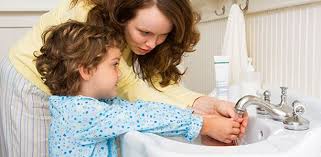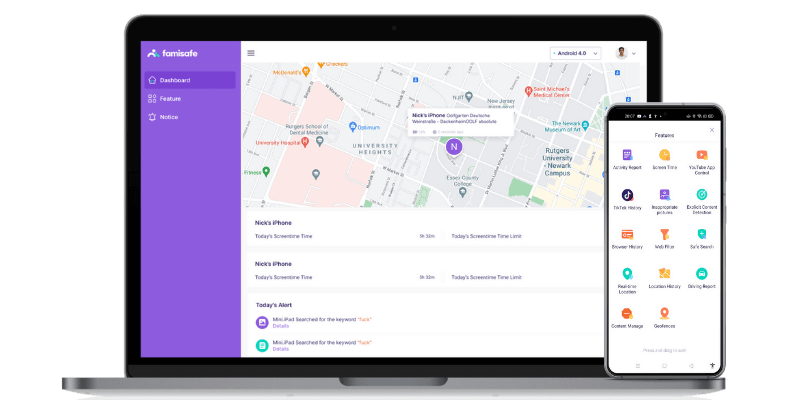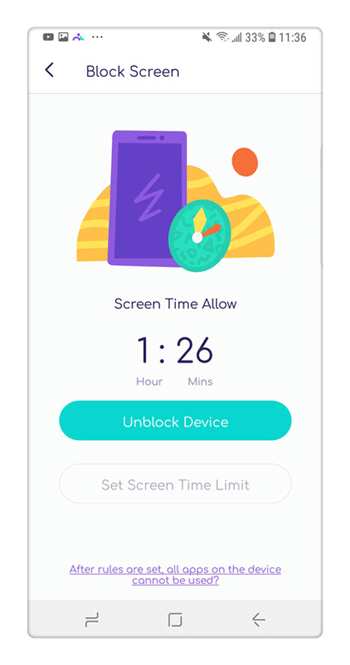How to Decrease Kids' Screen Time During Coronavirus
Ways to Avoid Kids Overusing their Phone
ALL TOPICS
- Parent Monitoring Tips
- Monitoring Apps
- Social Media Parental Control
Sep 11, 2024 Filed to: Parent's Guide Proven solutions
The rapid spread of coronavirus compelled worldwide governments to impose strict measures. One such preventive action is the school shutdown. Schools have some of the biggest gatherings of people under the same roof. Therefore, the chances of mass infection escalate.
The coronavirus lockdown has heightened a parent's concern for their kids spending too much screen time. Parents were already worried about cutting down their children, spending dangerous amounts of time over the phone to safer levels.

The American Academy of Pediatrics instructs limiting screen time as it may lead to brain development complications in children.
Further, the situation complicates as a majority of parents are now working from home. Managing Time between work and taking care of children has become a daunting task. Everyone is wondering about a solution to this serious problem.
What Problems will Parents face during Coronavirus Isolation?
Alarming Increase in Screen Time Amongst Kids
Guardians are aware that maintaining a balance between screen use and playing outdoors is crucial for physical and mental health. However, coronavirus-related lockdowns have made the latter a terrible idea.
On the other hand, as established earlier, too much screen time is equally wrong.
Here are some eye-opening evidence for parents.
- Countries such as Italy, where the outbreak has been the most severe have presented shocking data related to kids spending an alarmingly high amount of Time on phones. It's relatively healthy for a kid to spend about 20-30% screen time on their day-offs and vacations. But, COVID-19 mass quarantine has increased the same amount to 50-70%.
- Another report by Nielson states that there will be a significant rise of 60% in media consumption. An increase of such a degree is a matter of concern for parents around the world.
Parents Busy Working from Home cannot Guide Kids In Time
Many working parents are already stressed about school closures due to COVID-19 for multiple reasons. A lot of parents work during school hours to avoid hiring help from babysitters. Moreover, those with limited resources now have to provide extra meals that were otherwise offered by schools for free.

Making sure your child doesn't exceed the safe screen use limit is one thing; however, doing so while working is a whole another task.
Coronavirus lockdowns mean more Time at hand. Since kids cannot go outdoors or have company over, spending more time in front of screens seems like the only way out for children.
The majority of parents working from home cannot guide their children in Time or before things get out of hand. Excessive screen time is linked with:
- Mental and physical complications
- Harmful effects on the quality of sleep
- Increased chances of obesity
- Hampering impulse control
- Negative effects on communication skills
- Habit-forming behavior
- Proclivity towards violence
- Negative effects on vision
Talking about Coronavirus with Kids and Achieving Digital Balance during Lockdowns
Growing minds are apt at observing subtle details. When something like the COVID-19 outbreak takes place, it is almost impossible and unwise to cover up.
From TV, the internet, newspapers, and even at gatherings, coronavirus discussions are going on everywhere. They may have friends whose family members are quarantined. Therefore, your kids may already have an idea about something fishy going on. Half information can scare them. Hence, it is important to reassure children that things are going to be okay.
However, do not lie to them since they have access to the internet and media. So before discussing how to maintain digital balance, here are some suggestions on how you can talk to your child about COVID-19 in a healthy and age-appropriate way:
• Start with what your child may already know
Instead of jumping right into facts and details about the disease, let your child be the guide of the discussion. Ask them what they already know. For instance, if your child knows about the casualties and thinks they are going to be next, it is imperative to assure them.

On the other hand, if the child knows that it is a cousin of flu, then you must not bring up grim facts such as mortality rate and so on. Further, if your kid is under six years of age and is unaware of the virus, don't bring it to their notice. It is only going to contribute to unnecessary anxiety.
• Do Not Act Anxious around Kids
It is crucial to hide your anxiety while talking about COVID-19. Do not cause panic. Therefore, process your inhibitions and calm down. You can talk to someone close to you before you start the conversation with your kids. You do not want to give the impression that the world is a scary place.
• Stop Dismissing their Fears
It is unwise to straight away discard your child's fear with just a "you are going to be all right." You must pay attention to your child's anxiety and not be keen on closing the chapter abruptly. For instance, if your child thinks they are going to die, your child's concern is not going to go away with "it's absurd."

Sit him down and show them that you understand and reassure them that it is not how it works. Once the child feels better about the situation, you can restart the conversation and perhaps teach him about the preventive measures.
• Lay Stress on Maintaining Good Hygiene

Make sure you inform children about good hygiene. Also, ensure that they are practicing the 20-second hand wash rule. One way to do it is to turn the hand-washing into a competition. Further, kids tend to touch their faces a lot, pay extra attention to it.
Tips to Manage your Kid's Screen Time
- Make Daily Schedule:
devote a little time every morning to make a schedule for the day. Include tasks that will keep your kids busy and engaged. These may be doing the chores, reading a book, drawing or painting, playing an instrument, etc. This way, a portion of the day will be booked away from screens. Also, Switch off all screens at least one hour before going to bed.

- Communicate More:
Take screen time breaks of 45 minutes and talk to your kids more often. Make them realize that you are here for them so that they do not feel left out and resort to other things such as spending time in front of screens.
- Encourage Indoor Games:
Play board games or other educational games so that they don't get bored. If they can't take it anymore, you can try co-watching. It will help you monitor and control the content of your kids' views.
- Spend Kitchen Time:
Introduce science to your kids in a fun way. Show them how food changes its properties as it cooks, and so on. An added advantage of this is that you can monitor the activities of your child while you are busy doing chores. No mobile phones during meals
- Limit Screen Time:
Set a screen time limit of one hour for children of ages 2-5. Children below the age of 2 must avoid screen time altogether.

However, for some parents such as those working from home, doing all of the above is not possible. If you are one of them, do not worry. There is another incredible way to manage your kid's screen time.
Take Help of the Technology to Manage Children's Screen Time
There is no doubt that mobile phones and other media have immense educational benefits. However, when children exceed the safe screen time limits, things can go drastically awry. There is nothing better than technology to overcome the adverse effects of technology. Many tools can help you as a parent. One such incredible tool is FamiSafe.
FamiSafe - The Most Reliable Parental Control App
You can use FamiSafe to schedule your child's screen time. Yes, it is as simple as that. It is the best way for parents to keep a check on their kids while taking care of work from home.

- Regulate Screen Use:
FamiSafe helps you limit daily, weekly, and monthly screen use. It is necessary as countries around the world are advised to practice self-isolation of at least one week. Moreover, with FamiSafe, you can also see on what activities your child spends his/her time on the phone. Is it communicating, online activities, or other?

- Preset Usage:
You can set daily or weekly usage around specific locations. For example, school, etc. Since schools have been shut down and your kids are going to be home, you can preset screen time during bedtime. It will improve their sleep quality, and you can focus on your work.
- Block Devices:
You can use this feature to avoid your child from exceeding safe screen time limits. Block their device temporarily. It is excellent since older kids tend to stay up late using phones.

- Web Filtering
- Location Tracking & Geo-fencing
- App Blocker & App Activity Report
- Screen Time Limit & Schedule
- Explicit Content & Suspicious Photos Detection
- Real-time Location Tracker:
Track the location of your kid and save them from sneaking out of the house during coronavirus self-isolation. You may also create geofences for the same. You will be instant alerts when your child breaks planned routines.
- Monitor type of Content:
Precise content detection can help you keep track of suspicious activities and materials stored on your child's device.
- Loaded with other Safety Features:
FamiSafe has a plethora of features you can use during the coronavirus lockdowns for the mental and physical well-being of your child. Some of these include activity reports, web filters, smart schedules, and app blockers.
Check more about FamiSafe screen time feature
So, to sum it up, working parents can tremendously cut their concern for their children's screen use, especially during the coronavirus lockdowns. Filling Time with healthy activities is essential, and as parents deal with working remotely and taking care of kids, technology is a help unlike any.

Joanne Croft
staff Editor